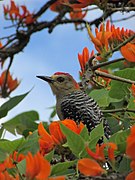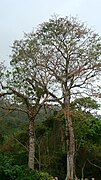
The Fabaceae or Leguminosae, commonly known as the legume, pea, or bean family, are a large and agriculturally important family of flowering plants. It includes trees, shrubs, and perennial or annual herbaceous plants, which are easily recognized by their fruit (legume) and their compound, stipulate leaves. The family is widely distributed, and is the third-largest land plant family in number of species, behind only the Orchidaceae and Asteraceae, with about 765 genera and nearly 20,000 known species.

A shade tree is a large tree whose primary role is to provide shade in the surrounding environment due to its spreading canopy and crown, where it may give shelter from sunlight in the heat of the summer for people who seek recreational needs in urban parks and house yards, and thus, also protecting them from the sun's harmful UV rays.

Mount Kinabalu is the highest mountain in Borneo and Malaysia. With an elevation of 4,095 metres (13,435 ft), it is the third-highest peak of an island on Earth, the 28th highest peak in Southeast Asia, and 20th most prominent mountain in the world. The mountain is located in Ranau district, West Coast Division of Sabah, Malaysia. It is protected as Kinabalu Park, a World Heritage Site.

Erythrina is a genus of plants in the pea family, Fabaceae. It contains about 130 species, which are distributed in tropical and subtropical regions worldwide. They are trees, with the larger species growing up to 30 m (98 ft) in height. These species are known for their large flowers with long and bright red or orange petals.
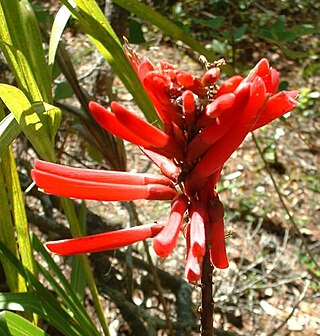
Erythrina herbacea, commonly known as the coral bean, Cherokee bean, Mamou plant in South Louisiana, red cardinal or cardinal spear, is a flowering shrub or small tree found throughout the southeastern United States and northeastern Mexico; it has also been reported from parts of Central America and, as an introduced species, from Pakistan. Various other systematic names have been used for this plant in the past, including Erythrina arborea, Erythrina hederifolia, Erythrina humilis, Erythrina rubicunda, Corallodendron herbaceum and Xyphanthus hederifolius.
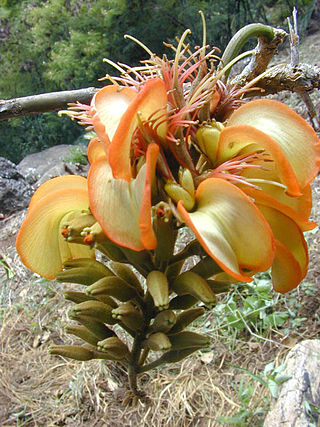
Wiliwili is a species of tree in the pea family, Fabaceae, that is endemic to the Hawaiian Islands. It is the only species of Erythrina that naturally occurs there. It is typically found in Hawaiian tropical dry forests on leeward island slopes up to an elevation of 600 m (2,000 ft).
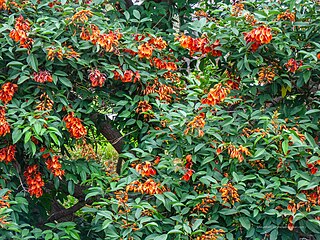
Erythrina crista-galli, also known as the cockspur coral tree, ceibo or corticeira, is a species of flowering tree in the family Fabaceae, native to Argentina, Uruguay, Bolivia, southern Brazil and Paraguay. It is widely planted as a street or garden tree in other countries, notably in California. Its specific epithet crista-galli means "cock's comb" in Latin.
Immortelle is another name for everlastings, plants in the family Asteraceae. It may also refer to:

Erythrina variegata, commonly known as tiger's claw or Indian coral tree, is a species of Erythrina native to the tropical and subtropical regions of eastern Africa, the Indian subcontinent, northern Australia, and the islands of the Indian Ocean and the western Pacific Ocean east to Fiji.

Erythrina vespertilio is a tree native to north and north-east Australia. Its common names are grey corkwood, bat's wing coral tree, yulbah and the more ambiguous "bean tree". In the Western Desert language it is known as ininti and the in Arrernte and Anmatyerr it is known as atywerety.
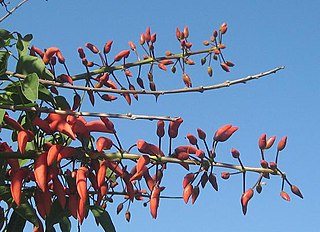
Erythrina falcata, commonly known as the Brazilian coral tree, is a timber tree in the family Fabaceae native to tropical South America. It can be found in Argentina, Bolivia the Atlantic Forest vegetation in Brazil, Paraguay and Peru. This plant is also used as a medicinal plant and ornamental plant which is attractive to birds.

Erythrina fusca is a species of flowering tree in the legume family, Fabaceae. It is known by many common names, including purple coraltree, gallito, bois immortelle, bucayo, and the more ambiguous "bucare" and "coral bean". E. fusca has the widest distribution of any Erythrina species; it is the only one found in both the New and Old World. It grows on coasts and along rivers in tropical Asia, Oceania, the Mascarene Islands, Madagascar, Africa, and the Neotropics.
Erythrina schliebenii is a species of legume in the family Fabaceae. It is found only in Tanzania. The species is named for German collector and botanist Hans-Joachim Schlieben.
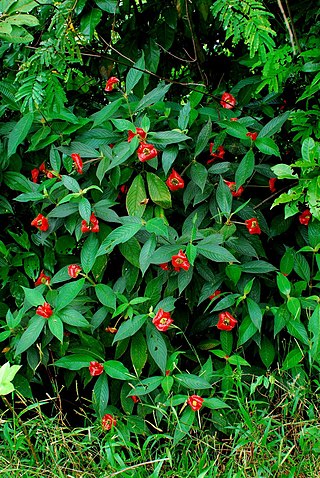
Palicourea tomentosa, many synonyms, including Psychotria poeppigiana, is a plant species in the family Rubiaceae. A common name is sore-mouth bush, though it is not very often used.

Erythrina afra, the coast coral tree or African coral tree, is a tree native to southeastern Africa, which is often cultivated and has introduced populations in California and India. All the 17 species of coral tree in the genus Erythrina are collectively considered the official tree of Los Angeles, California in the United States.

Erythrina zeyheri, commonly known as the ploughbreaker, is a deciduous, geoxylic subshrub and member of the family Fabaceae. It is endemic to southern Africa. It grows no more than 60 cm tall and occurs naturally in the higher elevation grasslands of South Africa's central plateau, and that of adjacent Lesotho. They favour deep clay soil in the vicinity of creeks and marshes, and often form colonies. Its specific name commemorates the 19th century botanist, Karl Zeyher.

Erythrina senegalensis, the Senegal coraltree, is a plant in the pea family Fabaceae, native to West Africa.

Dr. Esmé Frances Franklin Hennessy was a South African professor of Botany, botanical illustrator, and author. She specialized in taxonomic botany. She wrote and illustrated South African Erythrinas (1972), Orchids of Africa (1961) with Joyce Stewart, The Slipper Orchids (1989) with Tessa Hedge, and created many of the descriptions and plates in Flowering Plants of Africa as well as numerous private collections.

Erythrina suberosa, the corky coral tree, is a species of flowering plant in the family Fabaceae. It is native to the Indian Subcontinent, Southeast Asia, and Peninsular Malaysia. Due to its showy flowers and habit of flowering most of the year, it is often planted as an ornamental or street tree. Although the flowers can be used to make a refreshing drink, the seeds are poisonous.

Erythrina corallodendron, the red bean tree, is a species of flowering plant in the family Fabaceae. It is native to the Caribbean; Jamaica, Hispaniola, Puerto Rico, the Leeward Islands, and the Windward Islands, and has been introduced to Trinidad and Tobago, Kenya, Réunion, and the Malay Peninsula. A small tree usually 3 m (10 ft) tall, but rarely reaching 10 m (33 ft), and with showy flowers, it is often planted as an ornamental.




